Kondratieff Waves
Kondratieff Waves is a new international almanac that is published in co-operation with the International N. Kondratieff Foundation and the Faculty of Global Processes of Lomonosov Moscow State University from 2012.
Editorial Council:
Askar A. Akaev (Russia – Kyrghyzstan), Brian J. L. Berry (USA), Valentina M. Bondarenko (Russia), Tessaleno C. Devezas (Portugal –Brazil), Claude Diebolt (France), Sergey Yu. Glazyev (Russia), Ruslan S. Grinberg (Russia), Bert de Groot (Netherlands), Masaaki Hirooka (Japan), Boris N. Kuzyk (Russia), Witold Kwasnicki (Poland), Francisco Louçã (Portugal), Vladimir I. Maevsky (Russia), Leo Nefiodow (Germany), Carlota Perez (Venezuela – UK), Sanjay Prasad (India), Arno Tausch (Austria), William R. Thompson (USA), Andrew B. Tylecote (UK), Yuri V. Yakovets (Russia)-

Kondratieff Waves
Dimensions and Prospects at the Dawn of the 21st CenturyKondratieff Waves is a new international almanac that will be published in co-operation with the International N. Kondratieff Foundation and the Faculty of Global Processes of Lomonosov Moscow State University from 2012. The year when we plan to start the publicationof the Almanac is not coincidental at all, as this is the year of his 120th anniversary, as well as the 90th anniversary of the publication of his Mirovoye khozyaistvo i ego conyunktury vo vremya i posle voiny [The World Economyand it's Conjunctures during and after the War] (Vologda, 1922), where he first spelled out the idea of long cycles, which later became known as Kondratieff cycles, or Kondratieff waves (or just K-waves).
Call for Papers (.doc)
For Contributors (.doc)
-
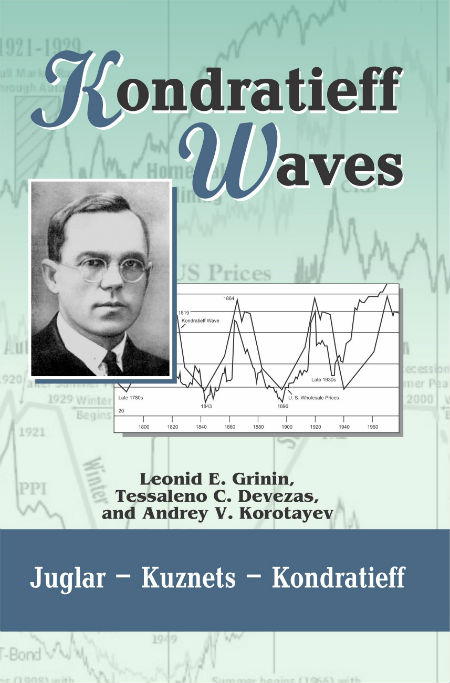
Kondratieff waves
Juglar – Kuznets – KondratieffIn the period from the 1920s to 1930s the theory of economic cycles underwent dramatic changes. Due to the research of such famous economists as Nikolay Kondratieff, Joseph Kitchin, Wesley Mitchell, Simon Kuznets, and Joseph Schumpeter the idea of a whole system of economic cycles (with characteristic periods between two and sixty years) was developed. The idea of a system of intertwined economic cycles is nowadays paramount to the school of evolutionary economics and its development promises rather interesting future outcomes. That is why this issue of our ‘Kondratieff Waves’ Yearbook is devoted to the interconnections between various economic cycles.
Call for Papers (.doc)
For Contributors (.doc)
-
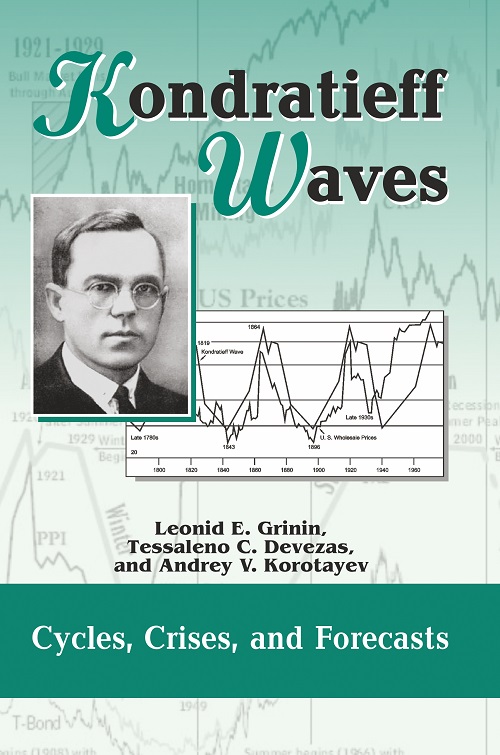
Kondratieff waves
Cycles, Crises, and ForecastsThough the researchers of the theory of long and medium-term cycles are certainly worried about the economic situation, they understand that the cyclicity still remains an inevitable attribute of economic development. And Juglar's aphorism that crisis is a consequence of the preceded prosperity is still true.
-
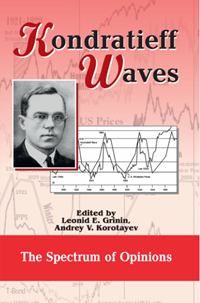
Kondratieff waves
The Spectrum of OpinionsThis issue will be useful for economists, social scientists, as well as for a wide range of those interested in the problems of the past, present, and future of global economy and globalization.
-
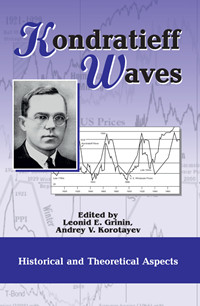
Kondratieff waves
Historical and Theoretical AspectsThis issue will be useful for economists, social scientists, as well as for a wide range of those interested in the problems of the past, present, and future of global economy and globalization.
-
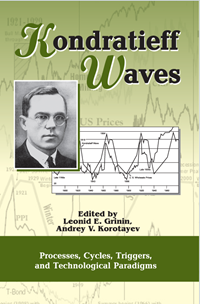
Kondratieff waves
Processes, Cycles, Triggers, and Technological ParadigmsThis issue will be useful for economists, social scientists, as well as for a wide range of those interested in the problems of the past, present, and future of global economy and globalization.
-
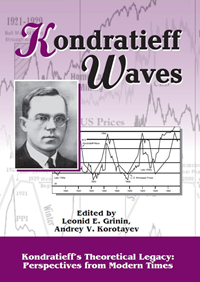
Kondratieff waves
Kondratieff's Theoretical Legacy: Perspectives from Modern TimesThis issue will be useful for economists, social scientists, as well as for a wide range of those interested in the problems of the past, present, and future of global economy and globalization.





